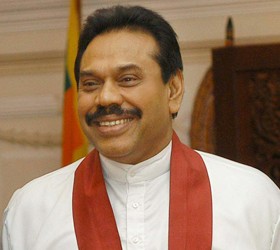
COLOMBO, Sri Lanka — Mahinda Rajapaksa, Sri Lanka’s president, declared victory in the his race for a second term Wednesday, but his main challenger, a retired army general who had been a close ally until a few months ago, rejected the tally and demanded a new vote.
Official results gave Mr. Rajapaksa, who ran on his victory against the Tamil Tiger insurgency, an 18-point advantage over his nearest opponent, Sarath Fonseka, the general who carried out the successful military operation against the Tigers.
Independent Sri Lankan election monitors said that there was no evidence of major fraud in the voting but left open the possibility of problems in the counting.
More broadly, election observers and advocacy groups have questioned the fundamental fairness of the campaign, accusing Mr. Rajapaksa of using state resources to run his campaign. State-owned news media all but shut out opposition candidates.
The results as reported by the commission illustrate the still-yawning ethnic and religious divides that plunged Sri Lanka into civil war in the first place, and underscore the difficulties Mr. Rajapaksa will face in trying to reconcile the country after 26 years of conflict.
Speaking as he greeted voters outside Sri Lanka’s election commission, Mr. Rajapaksa pledged to be a president for all Sri Lankans, not just those who voted for him, an apparent effort to reach out to Tamil voters who shunned him in large numbers.
General Fonseka, spent the day secluded in a Colombo five-star hotel, which the government surrounded with commandoes. He blasted the election results as “null and void” and promised to fight back, though he gave no details on how he would accomplish this.
“They are trying to make me a prisoner,” General Fonseka said, addressing a conference room packed with journalists. “They have made things very clear today.” Asked how he planned to challenge the vote General Fonseka said, “First I have to survive, then to act.”
Lucien Rajakarunanyake, a government spokesman, rejected the suggestion that General Fonseka was in danger, saying that the troops outside the hotel were merely for safety. “He is free to leave at any time,” the spokesman said.
But Rauf Hakeem, head of the Sri Lanka Muslim Congress, said that General Fonseka was unable to leave and feared for his safety.
“This is an overreaction to a perceived threat which they think is emanating from him,” he said, alluding to government hints that General Fonseka, who retired from the military in November to run for president, might try to mount a military coup.
The atmosphere at the hotel where General Fonseka has taken refuge was tense, with heavily armed soldiers standing guard outside. Several officials from his campaign said that they had been harassed by security forces, but these accounts were impossible to verify independently.
A long night of counting ballots confirmed that turnout in northern Tamil strongholds was very low, in the single digits in some war-hit areas, while voters had flocked to the polls in Mr. Rajapaksa’s southern stronghold.
Dayan Jayatilleka, a political analyst who was Sri Lanka’s representative to the United Nations in Geneva until the government fired him last year, said that the Tamil political parties had lost touch with the electorate during the long years of war.
“They have been engaging in the politics of exile,” Mr. Jayatilleka said. “They have not done the hard yards of rebuilding their political network.”
But election observers said that explosions and other disturbances, along with the heavy militarization of the northern and eastern Tamil areas, also suppressed the vote.
The other political parties in General Fonseka’s coalition also struggled to bring in voters. The center-right United National Party failed to deliver Colombo, its stronghold, for him, and the Marxist party known as the J.V.P., the Sinhalese acronym for People’s Freedom Party, seemed to make little headway against the president in their southern Sinhalese bastions.
General Fonseka, who ran on his record of winning the war against the Tamil Tigers, had counted on support from Tamil voters who he hoped would choose him over Mr. Rajapaksa as the more palatable of two unsavory options. Though General Fonseka led the military campaign that may have killed thousands of Tamil civilians, he portrayed himself as committed to healing ethnic divisions and allowing communities a greater measure of self-rule.
He also sought to capitalize on dissatisfaction with Mr. Rakapaksa in some quarters of the Sinhalese majority. Voters expressed concern about the concentration of power in Mr. Rakapaksa’s family. One of his brother is the powerful secretary of defence, another is a senior adviser, and many members of his extended family work in senior government positions.
But Mr. Rajapaksa emerges from the election in many ways stronger than ever. He ran on his war record, arguing that if he delivered on his pledge to win the war he could also bring a peace dividend and heal the nation’s ethnic rifts.
“The president keeps his promises,” said Gamage Banduwathie, who left the United National Party to support Mr. Rajapaksa in the election. “I hope that he will be a savior for Sri Lanka.”